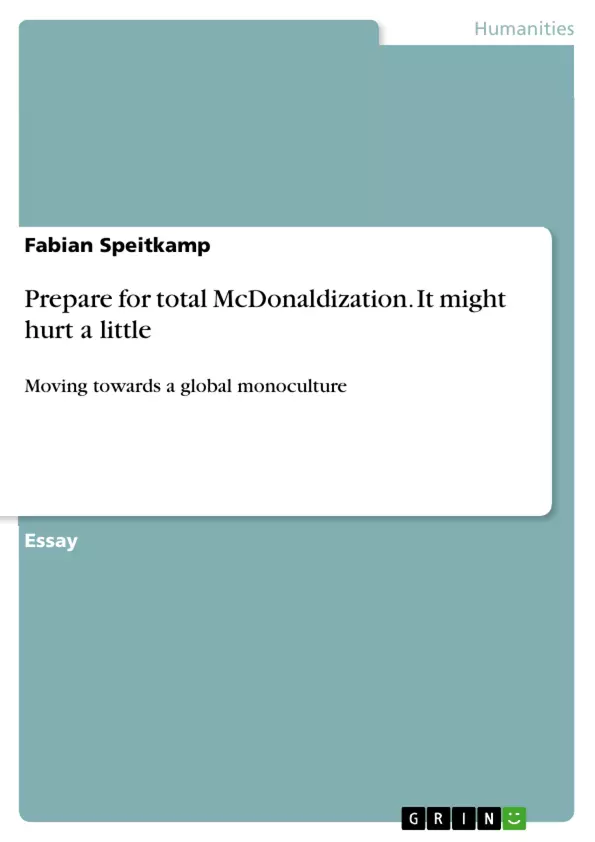We are one – at least that is how it feels when you hop of a plane in South Africa, Argentina, Australia, Japan or in the United States. Surely, as you take a cab to the next big city, listening to the radio playing Rihannas latest song, you will encounter familiar signs like the golden M of McDonald’s restaurants, which signals you that you can get a familiar burger here.
Later, you may decide to go to the movies and chances are high that you will see the latest Hollywood-Blockbuster. Of course you can pay your ticket with the same credit card you always use to buy your groceries in your home country. Globalization seems to be a blessing, everything is so familiar, predictable and therefore easy to handle. It seems that over time and with accelerating velocity the world has come together. All over the world we share a similar taste in music, food and movies, and on a political level depend on single governments who reign nation states with clear cut borders.
Of course, there are still some blind spots, for example McDonald's only has conquered 118 nations until December 20141, but it is only a matter of time, until everyone experiences the taste of a BigMac. But be warned, this convenient assimilation doesn't happen without tremendous costs, because under the cover of comfortable services lies the rationalization of every aspect of life. This rationalization is problematic, because it leads to a lack of cultural diversity and in addition transforms the world into a profit generating machine. The worst part: There is nobody to blame, but ourselves, because we started it!
Inhaltsverzeichnis (Table of Contents)
- Globalization and its effects
- Americanization and the media
- The emergence of nation states
- McDonaldization
- Homogenization vs. Cultural Diversity
- The Clash of Civilizations?
- World Culture and its implications
Zielsetzung und Themenschwerpunkte (Objectives and Key Themes)
This text explores the phenomenon of globalization and its impact on cultures and societies worldwide. It examines the processes of Americanization, the emergence of nation states, and the growing influence of McDonaldization in shaping a more homogenized world.
- The homogenizing effects of globalization
- The rise of Americanization and its impact on cultural landscapes
- The role of nation states in a globalized world
- The impact of McDonaldization on various aspects of society
- The tension between cultural diversity and homogenization
Zusammenfassung der Kapitel (Chapter Summaries)
- Globalization and its effects: This section delves into the multifaceted nature of globalization and its influence on cultural landscapes. It highlights the interconnectedness of global processes and the emergence of shared experiences, tastes, and trends. The author argues that globalization is not a uniform process but involves complex interactions and tensions between cultures.
- Americanization and the media: This section focuses on the pervasive influence of American culture, particularly in the media landscape. The author argues that American products, including Hollywood films, music, and social media platforms, have become dominant forces in global culture. This dominance, the author argues, contributes to a degree of cultural homogenization.
- The emergence of nation states: This section examines the rise of nation states as a global phenomenon. It argues that nation states are culturally constructed and embedded within a broader framework of world culture. The author explores how common practices, such as citizenship, rule of law, and education systems, have contributed to a degree of standardization across nation states.
- McDonaldization: This section introduces the concept of McDonaldization, a process characterized by efficiency, predictability, calculability, and the replacement of human labor with technology. The author argues that McDonaldization is not limited to the fast food industry but has extended to various sectors, including education and public services, contributing to a more homogenized world.
- Homogenization vs. Cultural Diversity: This section delves into the ongoing debate about the impact of globalization on cultural diversity. The author contrasts the views of those who argue for a single world culture and those who see a clash of civilizations. The text emphasizes the dynamic and complex nature of cultural development in a globalized world.
Schlüsselwörter (Keywords)
The text focuses on concepts like globalization, Americanization, McDonaldization, nation states, world culture, cultural homogenization, and cultural diversity. It also explores the role of media, social movements, and the influence of Western culture on shaping global trends. These terms collectively provide a framework for understanding the dynamic interactions between cultures and societies in a globalized world.
- Quote paper
- Fabian Speitkamp (Author), 2014, Prepare for total McDonaldization. It might hurt a little, Munich, GRIN Verlag, https://www.hausarbeiten.de/document/308939


